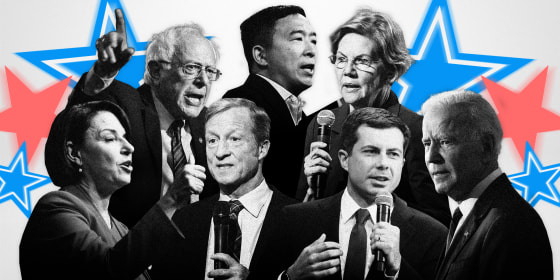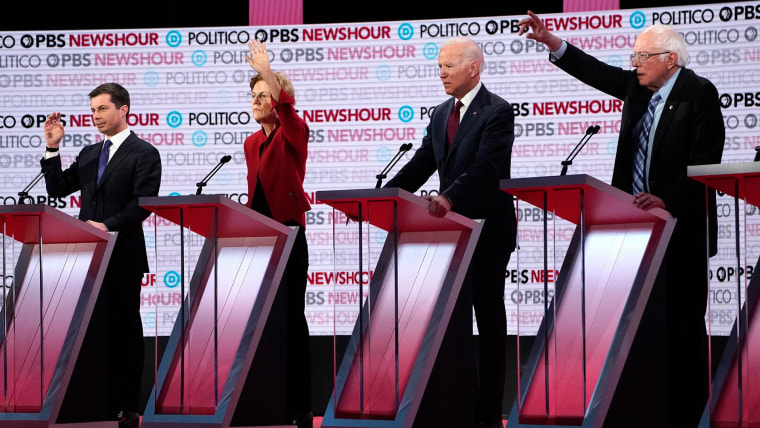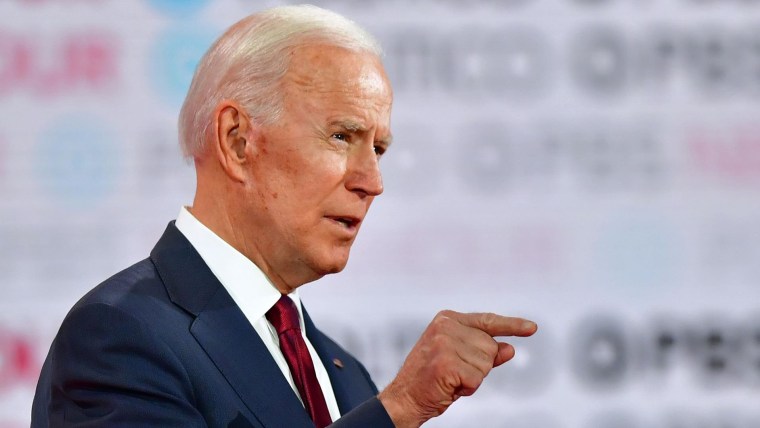NBC News provided up-to-the-minute coverage of the sixth Democratic presidential primary debate at Loyola Marymount University in Los Angeles.
The debate, hosted by PBS NewsHour and Politico, featured the most intimate group of candidates to date. Just seven of the leading candidates took the stage, including frontrunners former Vice President Joe Biden, Sens. Bernie Sanders and Elizabeth Warren, and South Bend, Indiana, Mayor Pete Buttigieg, as well as lower-tier candidates Sen. Amy Klobuchar of Minnesota, entrepreneur Andrew Yang, and billionaire activist Tom Steyer.
Who won the December Democratic debate?
A day after the House impeached President Donald Trump, the Democratic presidential contenders made their case for why they are best suited to take him on next year.
With the field of candidates on the debate stage Thursday night in Los Angeles narrowed to seven, there was more room for head-to-head conflict between contenders, with the bottom tier fighting to break into the top ranks and the top tier looking to break away from the pack.
With less than two months before voters begin weighing in, here’s a look at who landed their punches, who weathered the blows and who might have had their last moment on the debate stage.
Kamala Harris' husband: 'We are just enjoying each other right now'
Cost of living issues get limited time during debate
Detailed proposals to address the cost of living concerns vexing many Americans remained limited during Thursday night’s debate.
During the first hour of the debate, South Bend, Indiana, Mayor Pete Buttigieg — the candidate who benefitted from the wine cave fundraiser — mentioned a grim reality of full-time work at the minimum wage. A person earning $7.25 an hour, the federal minimum wage, takes home about $15,080 per year before taxes, if that person takes no time away from work. In 2018, about 1.7 million Americans earned the minimum wage or less, according to a March Bureau of Labor Statistics study. But, $15,080 is not enough to cover the cost of a two-bedroom apartment in any major city in the United States, according to a National Low Income Housing Coalition analysis of housing costs released this year. Buttigieg made reference to that fact on the debate stage.
When businessman Andrew Yang was asked to comment on the fact that he was the only candidate of color who met the Democratic Party’s polling and donation criteria to participate in the December debate, Yang responded with data hinting at the shape and size of inequality in the United States. Yang said that just 5 percent of Americans donate to campaigns because one must have disposable income to do so. A Pew analysis of The American National Election Study found that about 12 percent of Americans donated to political campaigns during the last presidential election cycle in 2016. That year, median incomes also climbed but differences between racial and ethnic groups remained significant.
In 2016, the median Asian household income reached $81,431, for white families $65,041, Latinos $47,675 and black households $39,490, according to U.S. Census data. Those figures all continued to climb in 2018. But, that year, nearly 40 percent of Americans indicated they would need to borrow to cover a $400 unexpected emergency expense and about 12 percent said they would have no way to cover such an expense at all, according to an annual Federal Reserve study of economic well-being.
The figures together suggest that the cost of living continues to outstrip earnings or come close for millions of Americans. During Thursday night’s debate, multiple candidates made mention of college and out of pocket medical costs — topics that have occupied large portions of previous debates. But gender and racial pay gaps, the return to stagnant overall wage growth, and cuts to social safety net programs such as SNAP (formerly known as food stamps) received little to no mention.
Sarah Sanders mocks Biden for stuttering. Biden responds, 'It’s called empathy. Look it up.'
Toward the end of the debate, former White House press secretary Sarah Huckabee Sanders mocked Biden on Twitter for accentuating a stutter in his response to a question about whether, in the spirit of the holidays, there was a candidate on stage to whom the others would ask forgiveness or give a gift.
“I I I I I I I I I I I I I I I hhhave absolutely no idea what Biden is talking about. #DemDebate,” Sanders tweeted.
In his answer on stage, Biden said Warren, who had just emphasized her personal contact with thousands of voters when taking selfies with them on the campaign trail, was not the only person who snapped photos with voters.
The former vice president said he’s done “thousands of them,” adding that people often “lay out their problems,” such as telling Biden — who lost his first wife and infant daughter in a car accident nearly 50 years ago to the day, and his eldest son to brain cancer in 2015 — about how they’ve lost a family member, or asking him whether they’re going to be okay.
Biden said that he and his wife, Jill Biden, have a list of people whom they call on a weekly or monthly basis.
“I tell them I’m here. I give them my private phone number. They keep in touch with me. A little kid who says, 'I, I, I, I, I, can’t talk. What do I do?' ” said Biden, who also has talked recently about how he’s dealt with a history of stuttering.
Biden responded to Sanders in a tweet, saying, “I’ve worked my whole life to overcome a stutter. And it’s my great honor to mentor kids who have experienced the same. It’s called empathy. Look it up.”
Sanders issued a follow-up tweet about 10 minutes after her initial one, both of which she later deleted, that said, “To be clear was not trying to make fun of anyone with a speech impediment. Simply pointing out I can’t follow much of anything Biden is talking about.”
Shortly after that, she apologized.
Female candidates ask for forgiveness for tone
Both female candidates on the stage, Warren and Klobuchar, asked for forgiveness for their tone during Thursday night’s debate, a nod to the unique challenges that women face in being judged for their demeanor in politics.
Asked by moderators to ask for forgiveness on something or offer a gift, two male candidates talked about gifting other candidates' books they’d written, while both women asked for forgiveness.
“I know sometimes I get really worked up and I know sometimes I get a little hot,” Warren said. “I don’t really mean to. What happens is when you do 100,000 selfies with people, you hear a lot of stories about people who are really down.”
Klobuchar later said she can be “blunt” in her campaign, because she thinks it’s so important.
“If I get worked up about this, it’s because I believe it so much in my heart that we have to bring people with us, not shut them out,” she added.
Candidates hit key themes in closing remarks
The seven candidates hit some of their key themes in closing remarks:
Steyer: Fight corporate power, term limits, climate change. Yang: Address why Trump won, get money out of Washington. Klobuchar: I can beat Trump, unite the country. Buttigieg: Build a bigger Democratic Party. Warren: Root out corruption, build social services. Sanders: Grassroots change from bottom up. Biden: Electability, someone who can get things done.
Trump campaign after debate: 'None of these characters has a chance'
“After yet another drab, pessimistic Democrat debate, it’s even more clear why they felt they had to impeach President Trump. None of these characters has a chance,” said campaign press secretary Kayleigh McEnany.
Yang saves a solid laugh line for closing statement
Closing statements came up quick — and Andrew Yang used his to earn some laughs.
“I know what you’re thinking America,” Yang said to open his remarks. “How am I still on the stage with them?"
The line prompted an uproar of laughter from the crowd.
Klobuchar points to the political challenges of health care
After a fiery exchange between Biden and Sanders over their respective health care plans, Klobuchar looked to calm the moment: “Whoa, guys, hey.”
She then pointed to a challenge for the ambitious health care plans (and really many of the plans discussed on stage tonight): politics.
“Here’s the political problem. This fight that you guys are having isn’t real,” she said, pointing to the need to work with other Democrats who want to build on Obamacare, including the new governor of Kentucky, Andy Beshear.
“If you want to cross a river over some troubled waters, you build a bridge. You don’t blow one up,” she added. “I think that we should build on the Affordable Care Act.”
Castro isn't there to take questions, so he asks one
On Afghanistan, Rep. Barbara Lee’s stand gets recognition
In response to a question about what to do about continued U.S. involvement in Afghanistan, Sanders said he was wrong to support the initial military action — and acknowledged the stand taken by Barbara Lee
Lee, a Democratic representative from California, has been an ardent anti-war advocate and was the only member of Congress to vote against military action after 9/11.
‘Medicare for All’ has grown more popular among Democratic voters
There’s been some speculation in the last month that Elizabeth Warren’s recent slip in the polls is linked to increasing skepticism over her "Medicare for All" plan.
The NBC/WSJ poll released today showed Warren down 5 percentage points since October and down 7 since her peak in September.
But the same poll also shows that the idea of expanding Medicare for all generally hasn’t lost steam with Democratic primary voters, despite an uptick in criticism of the plans from more centrist Democrats.
In fact, it’s gotten more popular with primary voters.
The poll showed that 68 percent of Democratic primary voters back a plan that would replace private health insurance with a single payer government health care system. That share was 63 percent back in October.
But the single-payer proposal remains far less popular outside the Democratic base. Just 44 percent of all adults say they back it, compared to 72 percent who back a more moderate Medicare buy-in program that would keep private insurance in place.
Klobuchar comms director swipes at Buttigieg comms director
LGBTQ community’s top candidates asked about trans violence
The two candidates, who according to a one-of-its-kind Out Magazine poll are the top two picks of LGBTQ voters, were asked how they would reduce violence against transgender people.
Bernie Sanders made an intersectional call for ending all forms of discrimination against “all minorities in this country” and pivoted to a call for universal health care.
Elizabeth Warren promised to “lift up their voices” and to read from the White House Rose Garden “the names of transgender women, of people of color, who have been killed in the past year,” to force a difficult conversation around violence against minority communities.
There are two tiers of talking time, and Sanders is in the middle.
In the top tier: Klobuchar, Buttigieg and Warren. In the bottom: Biden, Steyer and Yang. See the latest on candidate talking time here.
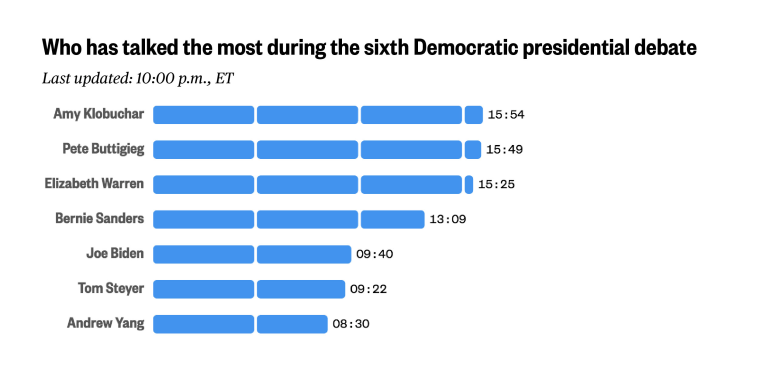
Candidates unify on immigration
Some of the strongest unity seen on the debate stage came when candidates were asked about immigration.
They vowed to undo President Trump’s immigration policies on Day One or in the first 100 days of their presidencies.
Tom Steyer delivered some of the harshest criticism, saying the president is against immigration by nonwhite people.
"This is his attempt to divide us on race. … He’s been vilifying nonwhite people. He’s been trying to inflame his base and scare them that if, in fact, white people lose control of this country, they are going to lose control of their lives,” he said.
Steyer said those arguments have led Trump “to break the laws of humanity in our name.”
None of the candidates mentioned decriminalizing crossing the border illegally, as Julián Castro first proposed and several Democrats have since endorsed, or whether to enact a moratorium on deportations, as some advocates have demanded.
Klobuchar claims moderate, Midwest bona fides
Amy Klobuchar — who is explicitly using her Minnesota roots to make a case for an Electoral College strategy — wasn’t having Pete Buttigieg’s attempt to claim better Midwest bona fides.
Klobuchar said Democrats have to create a coalition of “moderate Republicans and independents as well as a fired up democratic base” to win, and said she had done it three times by winning the midwestern state of Minnesota.
Buttigieg countered that some things matter more than “vote totals,” like “putting together a coalition to bring you back to office with 80 percent of the vote as a gay dude in Mike Pence’s Indiana” — a reference to his mayoral re-election campaign in South Bend.
Klobuchar snapped back: “If you had won in Indiana that would be one thing — you tried and lost by 20 points,” referring to Buttigieg’s ill-fated 2010 run for Indiana state treasurer in which he won less than 40 percent of the vote.
Reparations now?
Asked about his position on reparations, Pete Buttigieg said he supports a longstanding proposal to study the impact of paying reparations to the descendants of Africans enslaved in the United States. Then, Buttigieg suggested that in the interim, investments should be made immediately in the nation’s historically black colleges and universities, in creating equity in health care and education and expanding business opportunities because the effects of theft — in this case, the stolen labor, lives and liberty of the enslaved — compound over time, Buttigieg said.
But when the same question was put to former Vice President Joe Biden, he pivoted with an answer that described innovation as the critical element of American economic dominance. Biden then called for sustained investment in the nation’s increasingly Latino child population. Latino children made up 25 percent of the nation’s K-12 school-aged population in 2016, according to census data analyzed by the Pew Research Center.
No permanent friends, only permanent interests
The debate is showing how alliances can quickly shift, like in rounds of "Survivor."
After Warren squared off with Buttigieg and Buttigieg appeared to come out the victor, Klobuchar blindsided him. That was made possible by the fact that Warren hasn't laid a glove on Klobuchar — and the fact that both Warren and Klobuchar have an interest in knocking down Buttigieg for different reasons. Warren and Buttigieg are competing for liberal elites, while he's fighting Klobuchar for Iowans and other Midwestern moderates.
Klobuchar slammed him for having "mocked 100 years of experience" in belittling the work of Washington veterans like herself, Warren, Sanders and Biden.
"We should have someone heading up this ticket who has actually won," she said, noting that Buttigieg lost his statewide race in Indiana and his bid for Democratic National Committee chairman.
When he countered that he'd won re-election as a "gay dude" in "Mike Pence's Indiana," she shot back that South Bend isn't the whole state.
"If you had won in Indiana that would be one thing," she said before referring to his failed run for state treasurer. "You tried and you lost by 20 points."
Buttigieg has target on his back tonight
Buttigieg has emerged as the biggest target on stage for his fellow Democrats.
Moments after Warren knocked him for hosting closed-door fundraisers (particularly one that took place in California in a “wine cave”), Klobuchar went after the South Bend, Indiana, mayor. She alleged that he criticized at the last debate how much experience she, and others on stage, had.
“I think you should respect our experience,” Klobuchar said. “I respect yours as a local official, I’ve been one.”
Buttigieg hit back, saying to Klobuchar, “you actually did denigrate my experience.”
“I was going to let it go because we have bigger fish to fry,” he said.
But Klobuchar came back aggressively.
“We don’t have bigger fish to try than picking a president of the United States,” she said.
The increasing attacks on Buttigieg come as he’s emerged as the frontrunner in Iowa, whose voters will caucus in just 46 days.
Here’s the wine cave everyone hit Buttigieg over
Buttigieg has consistently taken heat for having closed-door fundraisers with big dollar donors — including in tonight's debate.
The Associated Press reported last week that Buttigieg dined privately with donors on Sunday at a winery owned by a billionaire couple.
The Hall Rutherford wine caves is in California's Napa Valley and has a chandelier with “1,500 Swarovski crystals, an onyx banquet table to reflect its luminescence and bottles of cabernet sauvignon that sell for as much as $900,” the AP reported.
The AP said the event was not listed on Buttigieg’s public schedule and reported that the mayor has raised more than $50 million so far this race.
Fact check: Did Warren’s campaign benefit from big-ticket fundraisers?
When Sen. Elizabeth Warren attacked Democrats who rake in top dollars in pricey fundraisers, South Bend Mayor Pete Buttigieg claimed that her campaign wasn’t as pure as she claimed.
“Senator, your presidential campaign right now, as we speak, is funded in part by money you transferred, having raised it at those same big ticket fundraisers you now denounce,” Buttigieg said.
He’s right. Warren transferred more than $10 million from her Senate campaign coffers to underwrite her presidential bid, giving her a healthy leg up on fundraising when she became a presidential contender. Warren did fundraising dinners right up until she easily won her 2018 Senate re-election bid.
Former Pennsylvania Gov. Ed Rendell organized a fund-raising dinner for Warren last year at a fancy steakhouse in Philadelphia with $120 cheesesteak, The New York Times reported in September.
The vibe has turned
After a mostly genial first hour, the candidates are starting to exchange plenty of jabs — and a few haymakers.
Candidates have attacked President Trump 30 times in the first 90 minutes
The attacks on President Trump flew fast and frequent in the first ten minutes of the sixth debate. Ninety minutes in and the president has been targeted 30 times, here's how the attacks break down.
And here's how many attacks were directed at Trump in the previous debates:
See the latest Trump attack numbers on our sixth debate attack tracker.
Sanders' team throwing 'wine cave' shade
Castro campaign again swipes at Buttigieg over 'privilege'
Warren and Buttigieg clash over campaign donations
In one of the standout moments of the night, Warren hit Buttigieg directly about how he is financing his campaign, specifically knocking him for hosting close-door fundraisers — particularly one that took place in California in a wine cave.
She noted that she ran grassroots campaign and talks to ordinary voters, and that meeting with big-ticket donors makes a candidate out of touch with ordinary issues.
“I do not sell access to my time,” she said.
Buttigieg hit back, saying it’s important to raise money to beat Trump and such party “purity tests” diminish the importance of the election. He also took a jab at Warren’s net worth, saying it’s several times more than his.
Klobuchar then jumped in, saying she did not come to the debate to hear that argument, and pivoted to how Senate Majority Leader Mitch McConnell has killed several bills that the Democratic-controlled House passed.
Klobuchar leading all candidates in talking time, Yang and Steyer talking the least
More than an hour into the sixth debate and Klobuchar has eclipsed Warren as the leader of the talking time race. See the latest on candidate talking time in the debate here.
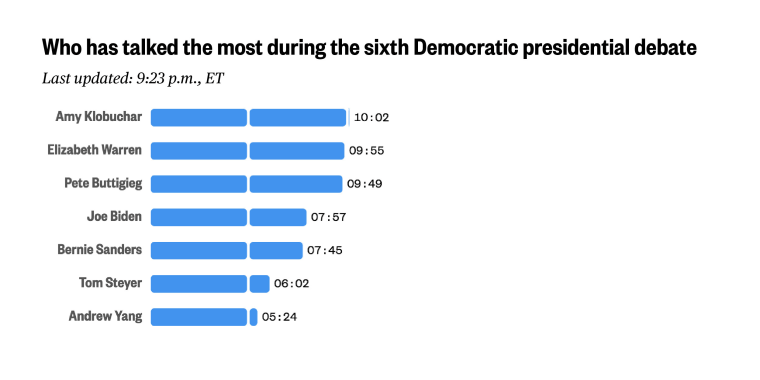
Biden won’t commit to second term
Biden — who would be 82 years old on Election Day in 2024 — was asked if he would commit to running for a second presidential term if he wins the 2020 election.
“No,” he said. “I’m not willing to commit one way or another."
“Let’s see where we are,” he added.
Politico reported earlier this month that Biden had been signaling to aides that he would only serve one term if elected.
Still, his refusal to say that he’d commit to serving two terms is a surprising admission. Politics watchers have pointed out that the fueling of questions over a one-term presidency — especially by Biden himself — could very easily make Biden a lame-duck president if he were elected.
Warren turns an age question
Tom Steyer calls China a 'frenemy'
The candidates are talking tough on China, but it’s Steyer who offers the most memorable answer.
After Buttigieg's response, Steyer pushes against the idea of isolation of China and ties his answer to the need to work together on climate change.
“We have to work with them as a frenemy, people who disturb us, who we disagree with, but who in effect we are linked with in a world that is ever getting closer,” Steyer says.
Trump tweets about impeachment in first hour of debate
Buttigieg's big promise
Buttigieg said he would leave open the option of boycotting Olympics in China as a sanction, but that wasn't his biggest threat. He said that if the Chinese were to repeat the 1989 Tiananmen Square massacre in Hong Kong, "they will be isolated from the free world and we will lead that isolation economically and diplomatically."
China's hardly the kind of country that can be isolated easily — it's no North Korea or Libya. It's not even Iran. China has the second-largest economy in the world. It has a permanent seat on the U.N. Security Council, and it has a lot of nuclear weapons. That is, China's got a lot of economic and diplomatic leverage.
Joaquin Castro tweets at Pete Buttigieg about 'wine cave'
This is what Castro seems to be referring to:
Climate change leads to nuclear — and thorium! — discussion
Nuclear energy is a controversial topic in the climate debate due to the risks of nuclear facilities and the waste it creates.
Yang took the opportunity to bring up a reasonably obscure technology: thorium reactors. Thorium is a slightly radioactive metallic element that has been touted as a way of generating nuclear power with less waste, though there aren’t currently any working thorium reactors. And there’s plenty of skepticism about whether it’s a good way to address climate change.
Yang: 'An honor and disappointment' to be only candidate of color on stage
Andrew Yang was asked about being the only candidate of color on stage at tonight’s debate.
“It’s both an honor and disappointment to be the lone candidate of color on the stage tonight,” Yang said. “I miss Kamala, I miss Cory, although I think Cory will be back."
Sen. Kamala Harris, D-Calif., dropped out of the race earlier this month, while Sen. Cory Booker, D-N.J., did not qualify for the debate.
Former Health and Human Services Secretary Julian Castro and former Massachusetts Gov. Deval Patrick also failed to qualify for the debate.
A moment later, Sanders was asked to answer the same question but began discussing climate change.
One of the moderators then chimed in.
“Senator, with all due respect, the question is about race,” PBS's Yamiche Alcindor said, prompting wild applause from the audience.
What Cory Booker is doing during the debate
Candidates agree on climate change, but quibble over details
The question about climate change showed that the candidates all clearly believe that it's real, a threat and must be handled immediately, but they wrangled over details, such as relocating towns during a climate emergency and moving away from certain jobs, such as coal miners and factory workers.
Biden said he doesn’t mind losing energy jobs if it means communities will be displaced by climate change because America can transition them to high-paying “clean” jobs. Klobuchar said it’s important to get the country back in the international climate accords and work toward green policies, which is also something Warren echoed.
But Warren also said that it’s important to get carbon out of the air and water as well as relying on nuclear to reduce carbon emissions by 2050.
Buttigieg said there needs to be widespread consensus in the entire country to deal with climate change.
Sanders, however, said the question “missed the mark” and said it’s about saving the planet, and America must lead that fight. He said he would declare climate change a national emergency.
Yang said we should pay to relocate communities affected by climate change.
74 percent of Democrats say climate change is an urgent problem
Candidates are speaking with plenty of urgency about climate change tonight, and it’s easy to see why: It’s an important issue to their base.
The latest NBC/WSJ poll finds that 74 percent of Democrats say that global climate change has been established as a serious problem and that immediate action is necessary.
That’s up 9 points in just the last two years. And it’s far more than the 45 percent of independents and just 12 percent of Republicans who agree.
The voters who have shown the biggest increase in concern about the issue over the last two years? Adults under 35 (up 12 points), and women both with college degrees (up 12 points) and without college degrees (up 13 points).
Those are key voters for the Democratic base.
Castro, not on stage, tweets responses to debate questions
Warren leading on talking time early in the debate, Biden barely on the board
Follow along with our debate-night candidate talking time tracker.
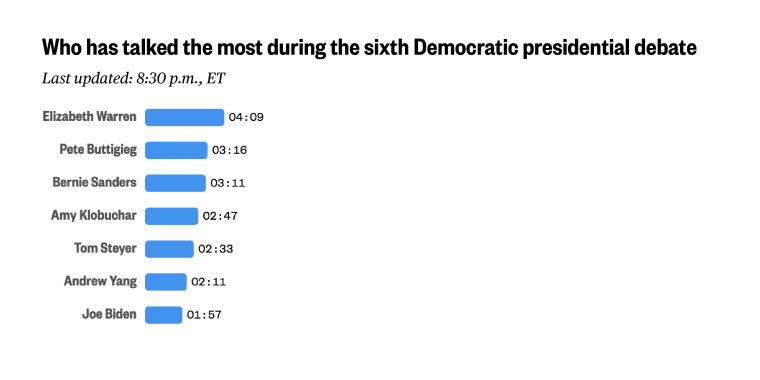
Fact check: Is Warren's wealth tax really just 2 cents?
“Let’s start with a wealth tax … a 2-cent tax on the great fortunes of this country, $50 million and above. For 2 cents, what can we do?” Warren asked. “We can invest in America.”
Sounds simple and cheap, right?
Well, it’s not really. The tax is 2 cents on every dollar of assets over $50 million (and 6 cents of every dollar over $1 billion). It’s also applied annually, so it would act like an income tax in many ways and would keep wealth from growing in some cases.
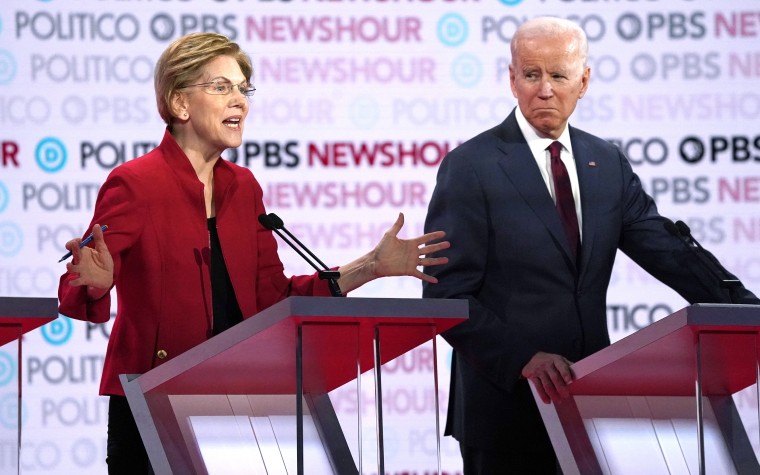
Wealthy investors with assets seeing a 6 percent return annually, for instance, would essentially see a 100 percent income tax on those assets over $1 billion.
It may sound like pennies, but the dollars add up big time: Two economists who advised Warren estimated recently that if her wealth tax had been in effect since 1982, Bill Gates’ wealth would be a fraction of what it is now.
Buttigieg takes on Warren
In what appeared to the first Democrat-on-Democrat attack of the evening, Buttigieg went after Warren (without mentioning her by name).
He said he respected “big” ideas and acknowledged that “taxes on wealthy individuals and corporations will have to go up.”
But, he added, Democrats must “make sure” they’re making “promises we can keep.”
For example, he said, “how about if... you’re at the top, you pay your own tuition.”
That seemed to be a direct attack on Warren’s proposal for universal free public college tuition. Buttigieg, and others, have proposed free public college tuition — but only for those who qualify financially.
Tulsi Gabbard not 'present'
Tulsi Gabbard’s absence from the debate stage is the subject of a few cracks on Twitter after she chose to vote “present” for both impeachment articles in the House votes Wednesday night.
Gabbard was one poll short of meeting the DNC criteria to participate in tonight's debate.
Trump campaign jabs Biden on economic growth
Buttigieg channels Obama
Who are the candidates attacking? Not each other
Twenty-five minutes into the debate and President Donald Trump is the only candidate the candidates on the stage have attacked.
See how long that lasts with our auto-updating Democratic debate candidate attack tracker.
Warren’s 3-word answer gets applause
Warren was asked about economic projections that predict that the massive tax increases she has proposed to fund her proposed agenda are likely to stifle economic growth.
“They’re just wrong,” she replied, prompting applause.
First question was on impeachment. Here’s how the candidates responded.
The opening question was how will the candidates convince voters to favor impeachment.
Biden said that the impeachment articles were a “constitutional necessity” and that it’s up to the Senate to move forward with a fair trial, but “my job is to make the case why he doesn't deserve another four years.”
Sanders said that in the “coming weeks and months” he will make the case to voters that President Trump sold out working-class voters through his politics and is corrupt.
Warren said the impeachment was a “constitutional moment” and that she will draw the sharpest distinction between Trump’s corruption and her policies.
Klobuchar argued that the way to move public opinion is to get key impeachment witnesses to testify in the Senate trial.
Buttigieg said Trump “left the House with no choice” and that it’s time to move past cynicism and its beyond public opinion and about focusing on policies that improve the working class
Steyer, who started ads calling for Trump’s impeachment two years ago, said that it’s also about getting key administration officials to testify.
Yang argued that impeachment should not be the focus but understanding what got Trump elected in the first place and offering policies that can win voters over and beat Trump in the general election.
Warren puts down a marker for her line of attack
In answer to the opening question about impeachment, Warren set down a marker for how she's going after not only Trump but Buttigieg and Biden, too.
She accused Trump of breaking his promise to "drain the swamp" in Washington, instead doing "everything he can" for the "wealthy" and "well connected."
"We need a candidate for president who can draw the sharpest distinction" between Trump and clean government, she said.
Close observers know she's taken Biden and Buttigieg to task for raising money at fundraising events hosted by wealthy donors and cast herself as unburdened by ties to corporate interests. That's the ground she wants to fight on — "who can draw the sharpest distinction" — in this debate and on the campaign trail. But don't expect Biden and Buttigieg to cede it. If she hits them more directly, they're likely to point to the legal work she did for big companies and the fundraising she did prior to her presidential campaign.
A disagreement on USMCA
The senators on stage were asked if they’ll vote to support the U.S.-Mexico-Canada Agreement — a top priority for Trump and which the Democratic-controlled House passed earlier Thursday.
Sanders said he wouldn’t, saying that it was only a “modest improvement over what we have right now” and slammed it as a deal that was “not going to stop outsourcing.”
Klobuchar, on the other hand, said she will vote for it.
“I believe we have a change with this agreement,” she said, comparing it to NAFTA.
Yang tries to get in an early word — and gets applause
Andrew Yang and his supporters have complained that he’s often overlooked in the debates. On the first question about why the country is so divided on impeachment and how the candidates would heal the division, he tried to jump in — even appearing to clap at moderator Judy Woodruff a couple times. But in a bit of confusion over who is being called on to answer, Steyer was allowed to go first.
Yang then got his chance and takes aim at the media and pointed out the loss of manufacturing jobs in the middle of the country.
“We have to stop being obsessed over impeachment, which unfortunately strikes many Americans like a ballgame where you know what the score is going to be and start actually digging in and solving the problems that got Donald Trump elected in the first place,” Yang said.
The candidates take the debate stage
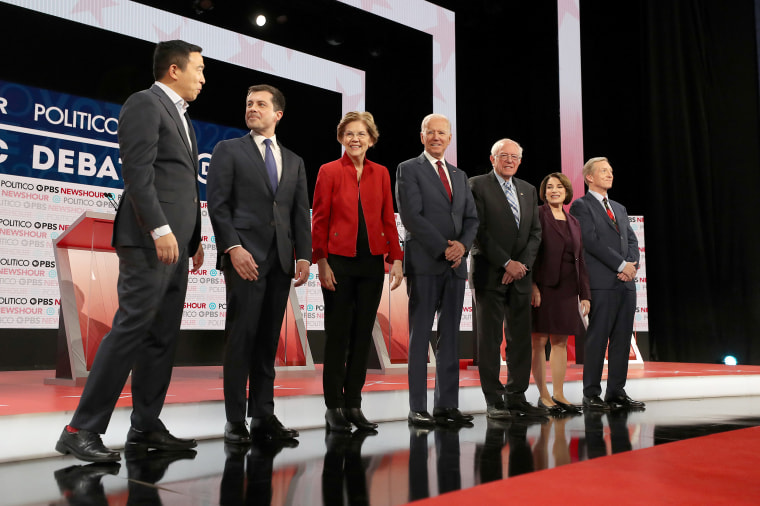
Andrew Yang and Donald Glover host pop-up shop
The Yang Gang recently added the support of actor and musician Donald Glover, who hosted a pop-up event with the candidate in Los Angeles on Thursday.
A variety of items were for sale with Yang campaign references, including limited-edition sweatshirts signed by Yang and Glover that sold for $1,000 each, according to NBC’s Priscilla Thompson. Money raised with the sales are going to Yang’s campaign.
How Elizabeth Warren plans to regain lost ground in high-stakes debate
Booker: 'It's a shame' debate won't reflect party's diversity
Poll tells tale of two different Democratic parties
It’s become a tale of two very different Democratic Parties: the Washington Democrats who are fighting President Trump through impeachment, and the 2020 presidential Democrats who rarely bring up impeachment on the campaign trail or at debates unless asked about it.
And the most recent NBC News/Wall Street Journal poll underscores this Democratic divide. In the poll, 45 percent of Democratic primary voters say the party’s main focus right now should be making the case that Trump should be removed from office, versus 46 percent who say the focus right now should be on defeating Trump at the ballot box next November.
The impeachment-first Democrats disproportionately consist of African Americans, seniors and women without college degrees. And Joe Biden is the top presidential choice for many of these voters.
The focus-on-November Democrats, on the other hand, are disproportionately white and younger voters, and their presidential preference is essentially tied among Biden, Bernie Sanders and Elizabeth Warren.
In some ways, this Democratic divide isn’t too surprising, with candidates like Biden believing that Trump is the existential threat to the country.
“Folks, let me tell you something, the single most important thing we have to accomplish, the single most important thing we have to accomplish is defeat Donald Trump,” Biden said in May at his kickoff rally in Philadelphia.
Sanders and Warren, on the other hand, believe the current economic and political system — not Trump — is the existential threat.
"I'm running for president to take on a corrupt system and get our economy working for everyone. I'm serious about delivering real change — and a lot of powerful people know it," Warren said in a speech last week.
Ahead of debate, Sanders's team 'riding wave of momentum
Castro, Booker not on stage, but present in campaign ads
They couldn’t get the needed polling numbers to be on the debate stage, but former Housing Secretary Julián Castro and Sen. Cory Booker of New Jersey made sure they would be seen Thursday.
The two released ads for television and social media hours before the debate got underway. Booker’s ad is part of a $500,000 TV and digital advertising buy and will be seen during the debate.
“I won’t be on tonight’s debate stage, but that’s OK because I’m going to win this election anyway,” Booker says in his 30-second ad, which is running on cable television in 22 markets.
Castro spent $50,000 on an ad that includes a clip from a recent Iowa event in which he called for more input from voters of color in the Democratic nominating process by ending Iowa’s first-in-the-nation status.
“Telling you the truth at a time when you have a president who won’t,” Castro says in his 30-second spot, which will run in Iowa. His campaign did not know what time the ad would air.
Booker, Castro and six other candidates sent a letter Saturday to Tom Perez, the chairman of the Democratic National Committee, asking him to lower the polling and fundraising thresholds they must meet to be onstage in the party’s January and February debates.
Castro is the only Latino candidate in the race, and Booker is one of two African Americans running for president now that California Sen. Kamala Harris has dropped out (the other candidate being former Massachusetts Gov. Deval Patrick). Andrew Yang is the only person of color on stage for this month’s debate.
Democratic debate in December: Everything you need to know
It almost didn't happen at all, but now seven candidates are set to take the stage on Thursday night at the Democratic presidential primary debate in California.
A union picket line had been announced for outside the venue, leading all of the candidates to declare they would rather miss the debate than cross it. But the union worked out a tentative deal with the contractor on Monday, and now the debate is on.
